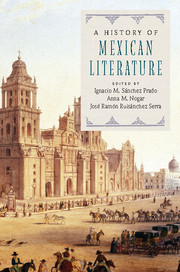Book contents
- Frontmatter
- Contents
- List of contributors
- Introduction
- PART I COLONIAL LITERATURE
- PART II THE NINETEENTH CENTURY
- 9 Early Nineteenth-Century Nation-Building Prose
- 10 The Emergence of the Mexican Literary Field (1833–1869)
- 11 The Rise of Cultural Institutions
- 12 Liberal Literat
- 13 The Conservative Paradigm
- 14 Mexican Modernismo
- PART III TWENTIETH AND TWENTY-FIRST CENTURIES
- PART IV MEXICAN LITERATURE BEYOND BOUNDARIES
- Index
- References
10 - The Emergence of the Mexican Literary Field (1833–1869)
from PART II - THE NINETEENTH CENTURY
Published online by Cambridge University Press: 05 July 2016
- Frontmatter
- Contents
- List of contributors
- Introduction
- PART I COLONIAL LITERATURE
- PART II THE NINETEENTH CENTURY
- 9 Early Nineteenth-Century Nation-Building Prose
- 10 The Emergence of the Mexican Literary Field (1833–1869)
- 11 The Rise of Cultural Institutions
- 12 Liberal Literat
- 13 The Conservative Paradigm
- 14 Mexican Modernismo
- PART III TWENTIETH AND TWENTY-FIRST CENTURIES
- PART IV MEXICAN LITERATURE BEYOND BOUNDARIES
- Index
- References
Summary
A single image prevails in every narrative of the development of Mexican literature: the image of an unsteady, delayed, and fragmented process. The emergence of the Mexican literary field was abrupt, plagued by interruptions, and had to endure periods of intense military and political crises. Yet even the first efforts to establish this field offer very clear objectives: the need to create a national literature – that is, to create a literature that represented the people, or at least the image the intellectual elite had of them – and this image was then to allow Mexico to gain cultural independence from Spain. Thus, Mexican literature was to build an identity and spread ideas that stemmed from the Enlightenment and liberalism. In other words, Mexican literature was to complement the national political project.
We see the first glimpses of a national literature in the fiction of José Joaquín Fernández de Lizardi, as well as in the essays and historical novels by the Cuban author José María Heredia, and in the latter's literary publications El Iris: Periódico crítico y literario (1826), La Miscelánea (1829–1832), and Minerva (1834). Heredia introduced modern European literature at a time when Mexican culture was still strongly tied to peninsular productions. He also planned a Mexican poetry anthology, La lira mexicana, which remained unpublished, with the aim of disseminating what he considered to be the most valuable literary work of his time. In the draft of the prologue, Heredia emphasized the merits of two poets: Manuel Sánchez de Tagle and Andrés Quintana Roo. Heredia highlights Sánchez Tagle's “sublime features,” and he calls Quintana Roo the first Mexican writer. At the same time, Heredia criticizes Quintana Roo's idleness and lack of literary commitment. Heredia offers what could be considered the first critical judgment of Mexican literature, specifically of poetry (the translation is by Rebecca Janzen, as is true of all other translations in this chapter unless otherwise specified): “I do not profess that this selection embodies works that could be considered models in their corresponding genres; but it will help by offering some idea of the rich Mexican inspiration (ingenio) …” (Ruedas de la Serna, 2014: 29).
Mexico achieved political emancipation from Spain in 1821; almost immediately thereafter, an intense and frequently violent dispute over the form of government ensued.
- Type
- Chapter
- Information
- A History of Mexican Literature , pp. 158 - 170Publisher: Cambridge University PressPrint publication year: 2016
References
- 1
- Cited by



